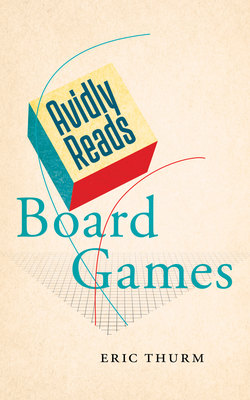Avidly Reads Board Games

Реклама. ООО «ЛитРес», ИНН: 7719571260.
Оглавление
Eric Thurm. Avidly Reads Board Games
Avidly Reads Board Games
Contents
1. Enter the Magic Circle
2. Playing Along with Complicity
3. Monopoly and Its Children
4. Can Friendship Be Stronger than War Games?
5. Legacy Games and the End of the Campaign
6. Game Night
Gameography
Acknowledgments
About the Author
Отрывок из книги
Avidly Reads
General Editors: Sarah Mesle and Sarah Blackwood
.....
Though the concept had been floating around for some time, designers Eric Zimmerman and Katie Salen took up the “magic circle” in their 2003 book Rules of Play, where it is broadly used to delineate between a game and the rest of life. But after years of debate, Zimmerman had to clarify his meaning and take the concept of the magic circle down a peg in a 2012 online essay about a fictional “magic circle jerk.” (Apparently a person enamored with the structural implications of the magic circle and not a euphemism for an academic conference.) Here, Zimmerman condenses the useful part of what to understand about the magic circle as a lens for thinking about games: “when a game is being played, new meanings are generated.” The magic circle is the boundary within which everyone’s behavior becomes, if not governed by the rules of whatever game everyone has agreed to play, then at least influenced by it—within the magic circle, you aren’t just your D&D character or Colonel Mustard, you’re also trying to think the way the game wants you to think, to act the way the game wants you to act.
But of course, there isn’t a one-to-one correlation between game rules and how they influence players. Unlike a video game that frequently has a set way for you to play through it and lives as code, board games require other people, and they only exist when you choose to play them. Games take on different characters in different contexts, with the same set of rules conforming themselves to a smoky party or a family dining room. This power that a board game has—the way it invites you to interact with it, to become what it wants you to become—is the central thing I’m interested in when I play games and when I think about them. It’s the main thing I want to explore here. And, obviously, it’s why my family loves Catan.
.....